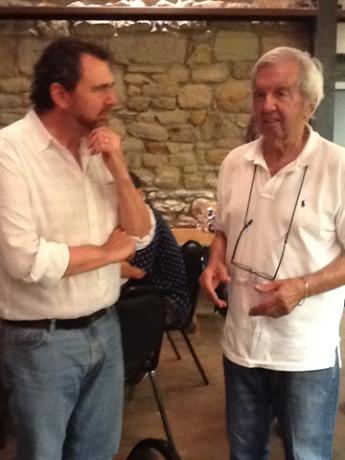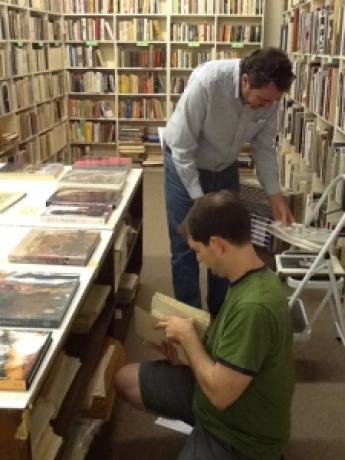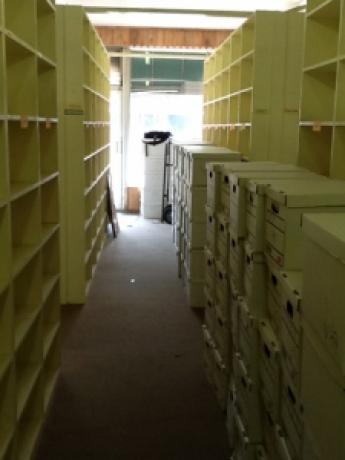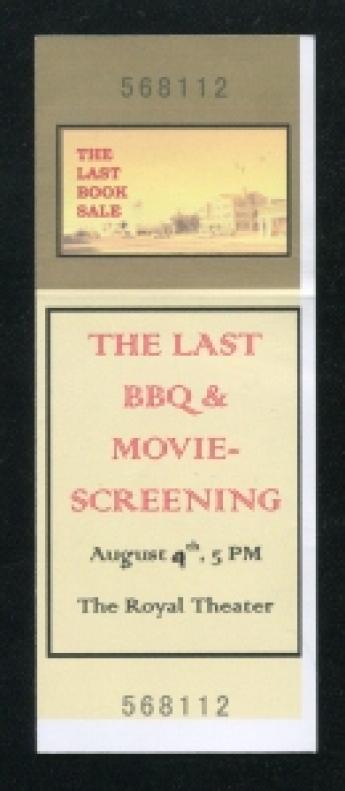Antiquarian Booksellers' Association of America Between the Covers Rare Books, Inc.
110 Degrees of Archer City
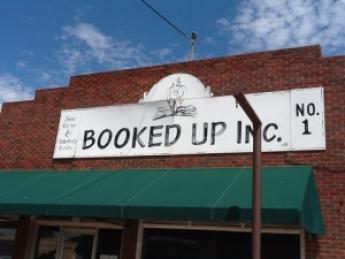
By Tom Congalton
As the roaming gangs of reporters, videographers, bloggers, and other media mavens have already made abundantly clear, Larry McMurtry held a two-day book auction – maybe more accurately, he held an event – in order to clear three of the four buildings in Archer City, Texas that he has packed full of the carefully selected better used and medium rare books that he has amassed in over a half century of bookscouting.
I had been to Booked Up when it was still in Georgetown, and later to Archer City as well, for the first time on a scouting trip in 2001 in the company of Kevin Johnson, owner of Royal Books in Baltimore. And while I’ve known Larry casually for nearly two decades, I did not (and still do not) know him particularly well.
However, I’ve shared a couple of meals and a few drinks with him in the past, and one thing about the way that Larry seems to perceive himself struck me as pretty remarkable.
Now if I had written a couple of dozen of novels, including one that had won the Pulitzer Prize (for Lonesome Dove), I might consider myself a writer.
Or, if several of those books had been made into notable films (Hud, The Last Picture Show, Terms of Endearment, and many others), and further added to this, if I had written many other screenplays, including one that had won me an Academy Award (shared with Diana Ossana, for Brokeback Mountain), I might consider myself more of a Hollywood kind of guy.
Obviously there are elements of all of these things in his personality – how could there not be? But in my limited experience, Larry doesn’t seem particularly interested in talking about writing, or film-making, or fame, or the famous folk he has known.
In my presence he has usually answered questions upon such topics politely, albeit briefly, and immediately deflected the conversation back to what he really wanted to talk about most. Books: rare books, book dealers, book collectors, libraries, bookstores, and the culture (or obsession) of collecting them.
In short I believe that Larry has defined himself first and foremost (aren’t they the same thing?) as a bookman; a hunter/gatherer of curious volumes, a purveyor of the obscure and amusing, and a collector of those volumes that he couldn’t personally resist. His acceptance speech at the Academy Award ceremony (interrupted somewhat by the always cringe-inducing musical scolds) made a point of thanking the booksellers of the world – the first, and undoubtedly the last time – that I sort of felt included in such an acknowledgement.
I do not know if the rumor is correct that Larry tried to wear his ABAA (Antiquarian Booksellers’ Association of America) cap on the red carpet, but I hope it is.
At any rate, the Between the Covers contingent: my wife Heidi, Matt Histand, and I, flew into Dallas and drove into Archer City on Wednesday, greeted by 110 degree temperatures, in order to begin to spend the better part of two days previewing the 1500 plus lots – most of which consisted of 150 volumes or more per lot.
This proved to be absolutely necessary for reasonably intelligent bidding, even if the viewing more times than not consisted of 30 seconds casting a glance over a bookcase that held hundreds of books, and saying, “yes,” “no,” or “maybe.”
A number of unprepared local punters showed up during the actual auction, apparently expecting each lot to be displayed to them, and more than once I heard some variation of the question: “But how are we supposed to know what we’re bidding on?”
The answer: “You’re not”.
It is curious that neither this, nor the $50 registration fee (refundable against purchases) served to discourage some bidders who seemed to have shown up mostly just to secure a souvenir or token lot, and went forth blithely to secure some mystery purchase.
On the Thursday evening before the auction, Larry hosted a Texas barbeque and beer dinner for registered bidders. Vast amounts of both were consumed, (although curiously, there were four different types of barbeque offered, and for some reason that I wasn’t made aware, I was told by the server: “Sorry, but you don’t get a fourth meat.”).
After dinner Larry introduced a screening of the 1971 film made from his own novel, both entitled The Last Picture Show, at the renovated Royal Theater, a couple of doors down from Booked Up No. 4, where the auction would be held the next day. I’ve always loved the film, and happily I still do, and just as happily the beer was still flowing freely – although I was still sort of hoping that they’d relent about that “fourth meat.”
Watching the film in the same theater and the same town where it was filmed was sort of strange, in a good way.
Apparently this was the biggest event in Archer City since the film was made and the locals had pitched in, with the few local eateries opening early and closing late. The breakfast was both tasty and capacious at the Wildcat Café, and Larry generously and surreptitiously picked up our check on Thursday morning. But on the Friday morning of the auction, the Cafe was so overwhelmed by the crush of bidders that after an hour of waiting I was forced to leave Matt behind to have my breakfast boxed to go, and then surreptitiously discarded, as I didn’t want to be eating fried eggs, bacon, and hash-browns, while I was bidding in the middle of the crush of 200 registered bidders and other onlookers. This left me with the curious experience of eating one meal at the Cafe and not paying for it and paying for another but not eating it. They do things different in Texas.
At any rate I hustled over to the auction wondering if there were enough people in America, or at least Texas, to absorb 300,000 books.
The auction began after a brief preamble from Larry, who was joined by his family in a small cordoned off section. This included Larry’s wife of recent vintage, Faye – they were married barely a year ago – who seemed to cast a beatific and serene, if slightly bemused eye on the proceedings. One wonders what kind of an effect it would have on one’s spouse knowing that they were marrying into nearly half a million books?
At any rate the bidding began and was surprisingly spirited, with one gentleman: short, in a bright red shirt and blue jeans and with a thick white brush mustache buying several of the first few lots for clearly competitive amounts of money. The auction room rumor, picked up from various dealers, was that the gentleman was representing a consortium of dealers from Michigan – a bit of knowledge that later turned out to be false.
Although not entirely surprising to me – as the traditional “rare” book trade seems to be increasing disinterested in either used and medium rare books, or in large inventories; I appeared to be the only ABAA dealer attending (with the exception of Larry McMurtry himself).
During the preview, Clarence Wolf of George S. MacManus in Bryn Mawr was passing through the area and apparently stacked up some books to buy in Booked Up No. 1, the one store that Larry is keeping open, and where books were priced and being offered for sale. The Texas bookseller Kevin Mac Donnell was also seen about the premises – we spoke briefly – but neither of them stayed for the auction. If there were any other ABAA dealers present (and I’m sure there are a few I haven’t met), they kept a very low profile.
However, plenty of other dealers attended including Powell’s from Oregon and Midtown Scholar Books from Harrisburg, Pennsylvania, both of whom were big buyers, and many other dealers, a few I knew, but most were either previously unknown to me or known only by reputation or as listers on Internet book search sites. Most curiously, I met several quite young people who were contemplating careers as booksellers and had shown up in order to acquire inventory.
Virtually all of the lots that were offered on the first day were sold. I bought plays and a few lots of better fiction that were sort of hidden amongst the fiction overflow in building No. 4, as well as three of the lots from “The McMurtry 100.”
This was perhaps the most misunderstood part of the sale. These were 100 individual titles that Larry had chosen to illustrate what he found interesting and unusual and representative of his inventory. While a few of these lots were relatively expensive, including one lot of erotic manuscripts that I bought for $2750 hammer, most of them were by no means rare and generally sold in the low three or even two figures.
I think some of the bidders were laboring under the misconception that these were the very best books in the sale, and there was occasionally spirited bidding so that some visitor or another could secure one of these treasures. One woman was quite put out that she failed to secure one such lot: a finely bound manuscript about diseases of the swine, and she complained mightily about it throughout the rest of the day.
Apparently the erotic manuscripts brought the highest price of the day (or maybe of the whole sale), and I can be seen in a photograph on the Houston Chronicle website bidding on it, looking both disinterested and perhaps mildly drunk, although I can assure you that I was neither. Perhaps if they had caught me later in the day, after the leftover beer from the barbeque was provided to the bidders, such a case could be made.
One interesting sideshow was that the auction, and indeed the whole event, was clearly captured for posterity, with reporters from The New York Times, Reuters, The Atlantic, The New Republic, Time Magazine, NPR, the Dallas and Houston daily papers, and several other national magazines, as well as various film crews and documentarians scurrying about. After a while I found myself (and presumably so did every other person there) being interviewed constantly, sometimes in tandem by two reporters. I haven’t been in so much demand since my cell phone bill was overdue. I guess there is still some interest in the book, even if it is only to declare it as an obsolete remnant of a by-gone culture.
On Friday night of the sale, the Royal Theater again played host to an event, with a concert by Larry’s talented son James McMurtry, whose music has been labeled pretty much everything from folk, country, alternative, and/or rock, and which in truth is probably all-of-the-above in some part or another. James’ own son Curtis McMurtry opened the show, so it was pretty much another family affair.
While Friday was largely taken up with disposing of the contents of Building No. 4, Saturday’s focus was on Buildings No. 2 and 3. These buildings probably held better books than No. 4, and I bought heavily from the stock of turn of the century decorated bindings, poetry, and selected lots of fiction, as well as four of the five table lots that held broadsides, ‘zines, pamphlets, and other oddities.
As the day wore on, the final 100 lots of the sale, mostly middling fiction, sold sluggishly, with many lots bid in.
Larry, in his blog in The New York Review of Books stated: “Everything sold but the fiction. Everyone who deals in fiction has plenty, and more is spilling onto the market from the sale of the Serendipity Books stock now being dispersed on the West Coast.”
I think he was at least partially correct, but my own observation is that not least of the reason was that by the time that the fiction came to be offered, the auction had exhausted its own demographic. While it might not have exhausted the pocketbooks of the bidders, many of those who might otherwise have waded in to acquire some of it were probably reeling from the realization that they were now going to have to figure out how to remove many thousands of books from Northeast Texas.
Suffice it to say that I was one of those people. Heidi and some of our staff, along with hired temps, traveled back to Archer City to pack and load a tractor trailer full of the stuff. If the auction had been in the next town, or even in the next state, I might have been more bullish on buying fiction.
The aftermath of the sale was amusing in itself, with successful bidders scurrying around trundling boxes, and looking by turns determined and confused, and often driving off into the sunset with their bumpers scraping the road surface, while others made arrangements to come back for second, third, and probably fourth trips.
According to an interview with the auctioneer, the genial Michael Addison from Addison & Sarova in Macon, Georgia, the sale brought about $200,000 hammer, or around $240,000 after the buyer’s premium, although I would have guessed more based on my own per unit cost. I hope that’s because I was buying better lots, and not just overpaying for mediocre ones.
One might have thought that McMurtry’s return, probably less than a dollar per book, could be viewed as something of a failure. But rather I think it could be viewed as something of a triumph. From my point of view it was a win-win situation. Vast numbers of good books were released throughout the country back into the trade and to collectors at reasonable cost, but still for what added up to a reasonably formidable sum of money.
And despite the re-distribution of books, Archer City still has many times more books than people (although perhaps the books themselves are outnumbered by the crickets that wandered the town and occasionally into the auction and bookstores).
I think that what Larry McMurtry did was a very smart thing. He claimed to be hosting an auction, but what he really was hosting was an adventure. Several hundred people came to Archer City, bought books at the auction and left happy with the prices, visited the bookstore, met a famous author, drank beer and ate barbeque, and generally had a lovely and memorable time.
Finally, as we waited to pay for our purchases, I encountered the ringleader of the “Michigan dealer’s consortium” packing books with a friend. He seemed an affable sort, and I asked him how many lots he had bought:
“’Bout 120.”
A quick calculation made that around 20,000 books.
“You’re a dealer, I understand?”
He happily replied, “Hellll, no. These r fur r liberry!”
I asked what else he was interested in, received an answer I could work with, and got his card.
He was a local oil man.
(Published in the Between the Covers Blog. Presented here by permission of the author.)
